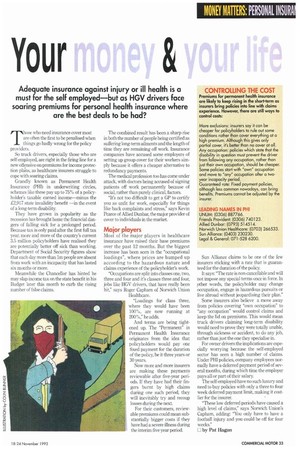Your &
Page 35

If you've noticed an error in this article please click here to report it so we can fix it.
Adequate insurance against injury or ill health is a must for the self employed—but as HGV drivers face soaring premiums for personal health insurance where are the best deals to be had?
Those who need insurance cover most are often the first to be penalised when things go badly wrong for the policy providers.
So truck drivers, especially those who are self-employed, are right in the firing line for a new offensive on premiums for income protection plans, as healthcare insurers struggle to cope with soaring claims.
Grandly known as Permanent Health Insurance (PHI) in underwriting circles, schemes like these pay up to 75% of a policyholder's taxable earned income—minus the £2,917 state invalidity benefit —in the event of a long-term disability They have grown in popularity as the recession has brought home the financial dangers of falling sick for a prolonged period. Because tax is only paid after the first full tax year, more and more of the country's current 3.5 million policyholders have realised they are potentially better off sick than working. Department of Social Security figures show that each day more than 1m people are absent from work with an incapacity that has lasted six months or more.
Meanwhile the Chancellor has hinted he may Slap income tax on the state benefit in his Budget later this month to curb the rising number of false claims. The combined result has been a sharp rise in both the number of people being certified as suffering long-term ailments and the length of time they are remaining off work. Insurance companies have accused some employers of setting up group cover for their workers simply because it offers a cheaper alternative to redundancy payments.
The medical profession too has come under attack, with doctors being accused of signing patients off work permanently because of social, rather than purely clinical, factors.
"It's not too difficult to get a GP to certify you as unfit for work, especially for things like back complaints and stress," says Kevin Pearce of Allied Dunbar, the major provider of cover to individuals in the market.
Major players
Most of the major players in healthcare insurance have raised their base premiums over the past 12 months. But the biggest increase has been seen in the "occupational loadings", where prices are bumped up according to the hazardous nature and claims experience of the policyholder's work.
"Occupations are split into classes one, two, three and four and it's classes three and four, jobs like HGV drivers, that have really been hit," says Roger Capham of Norwich Union Healthcare, "Loadings for class three, where they would have been 100%, are now running at 200% ," he adds.
And terms are being tightened up. The "Permanent" in Permanent Health Insurance originates from the idea that policyholders would pay one fixed payment for the duration of the policy, be it three years or 30 years.
Now more and more insurers are making these payments reviewable after five-year periods. If they have had their fingers burnt by high claims during one such period, they will inevitably try and recoup losses during the next.
For their customers, reviewable premiums could mean substantially bigger costs if they have had a severe illness during the interim five year period. Sun Alliance claims to be one of the few insurers sticking with a rate that is guaranteed for the duration of the policy It says: "The rate is non-cancellable and will not impose any special terms once in force. In other words, the policyholder may change occupation, engage in hazardous pursuits or live abroad without jeopardising their plan."
Some insurers also believe a move away from policies covering "own occupation" to "any occupation" would control claims and keep the lid on premiums. This would mean truck drivers claiming long-term disability would need to prove they were totally unable, through sickness or accident, to do any job, rather than just the one they specialise in.
For owner drivers the implications are especially worrying because the self-employed sector has seen a high number of claims. Under PH1 policies, company employees normally have a deferred payment period of several months, during which time the employer pays all or part of their salary.
The self-employed have no such luxury and need to buy policies with only a three to four week deferred payment limit, making it costlier for the insurer.
"These low deferred periods have caused a high level of claims," says Norwich Union's Capham, adding: "You only have to have a football injury and you could be off for four weeks."
U by Pat Hagan




















































































































